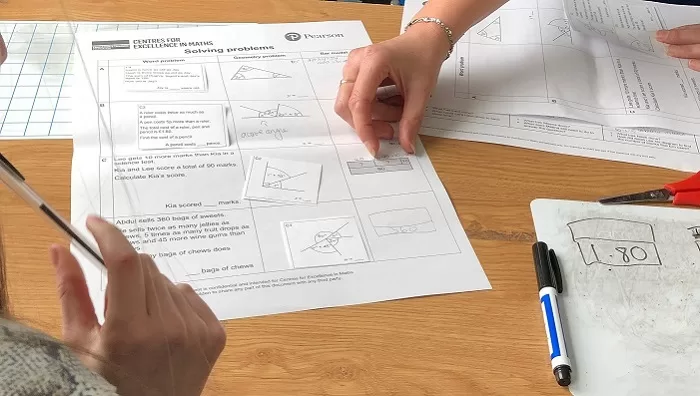Education
New Teaching Approach Found to Improve GCSE Maths Resit Scores, According to Study

A study analysing the use of a new teaching approach for post-16 students re-sitting their maths GCSEs has found a measured improvement in their exam scores, with particularly pronounced benefits for learners from deprived backgrounds.
The research was carried out by the Centre for Research in Mathematics Education (CRME) at the University of Nottingham on behalf of the Education and Training Foundation (ETF) as part of its Centres for Excellence in Maths (CfEM) programme. The study involved 147 college sites across England and 7,453 students during the 2021–22 academic year.
The randomised controlled trial (in which participants are randomly allocated to a group to be studied) investigated two levels of intervention: a ‘partial’ design that involved teachers working with lesson resources that exemplified CfEM’s five key principles of Teaching for Mastery in FE; and a ‘full’ intervention that additionally included a programme of lesson study by teachers. The lesson study involved teachers observing lessons to experience them from the perspective of learners, and then discussing what they had seen with other teachers afterwards.
The academics found that both the ‘partial’ and ‘full’ interventions had a small effect in terms of improving students’ GCSE scores when compared to students who were taught by teachers who were not part of either intervention. Students of teachers taking part in the lesson study model performed better than those of teachers in the partial intervention.
Although students of teachers experiencing the partial intervention had slightly better scores compared to learners taught not involved in the interventions, they had no discernible increase in ‘learning months’. Students taught by ‘full intervention’ teachers, however, experienced an average of one month’s learning gain.
Importantly, students from the most deprived backgrounds (as measured by uptake of Free School Meals) taught by teachers in the ‘full intervention’ performed even better; at a level that translates to two additional months of learning. These students were found to benefit most from learning maths in the content of the exemplary lessons.
Overall, the researchers believe, the factor that makes most difference is that of the lesson study engagement of the teachers in the ‘full intervention’. This practice is now used in various adaptations in many countries and has become an integral part of much of the work of the University of Nottingham’s CRME over the last decade, with researchers working with colleagues in Japan, where the practice originated.
The study, which was supported by Department for Education funding, is the first time the efficacy of the lesson study approach has been validated in this way in a large-scale, randomised controlled trial covering a national assessment. Full details of the research findings are available via the Centres for Excellence in Maths pages of the ETF website: https://www.et-foundation.co.uk/professional-development/maths-and-english/cfem/cfem-resources-and-evidence/cfem-evidence/mastery-randomised-controlled-trial/
The findings of our research are hugely encouraging in pointing to ways we might help the teaching and learning of students who have often found mathematics particularly difficult. We were pleased to find that the approaches we designed and trialled especially assisted learners who are at a significant disadvantage because of their socio-economic status.
Geoff Wake, Professor of Mathematics Education in the School of Education at the University of Nottingham
Professor Wake, who led the research, continued: “We hope to be able to build on what we have learned from this research to support such students to gain better outcomes in mathematics GCSE which is known to improve their future life chances.”
Steve Pardoe, Head of the Centres for Excellence in Maths programme at the ETF, said: “This research is genuinely groundbreaking. It demonstrates that improvements in learner outcomes in maths are possible and points to the importance of Mastery approaches in unlocking them. We’d like to thank the team at Nottingham who have led this research on our behalf. This is yet another example of the Education and Training Foundation partnering with leading organisations to produce outstanding outcomes for the FE and Training sector.”
Also available on the CfEM pages of the ETF website are the Teaching for Mastery in Further Education: a handbook for practitioners and the classroom resources for the Mastery lessons.
Centres for Excellence in Maths was a five-year national improvement programme aimed at delivering sustained improvements in maths outcomes for 16–19-year-olds, up to Level 2, in post-16 settings. It explored what works for teachers and students, focusing particularly on an adapted mastery approach to maths suitable for post-16 learners and building networks of maths professionals in colleges. The project finished at the end of March 2023.
Source: University of Nottingham



















































